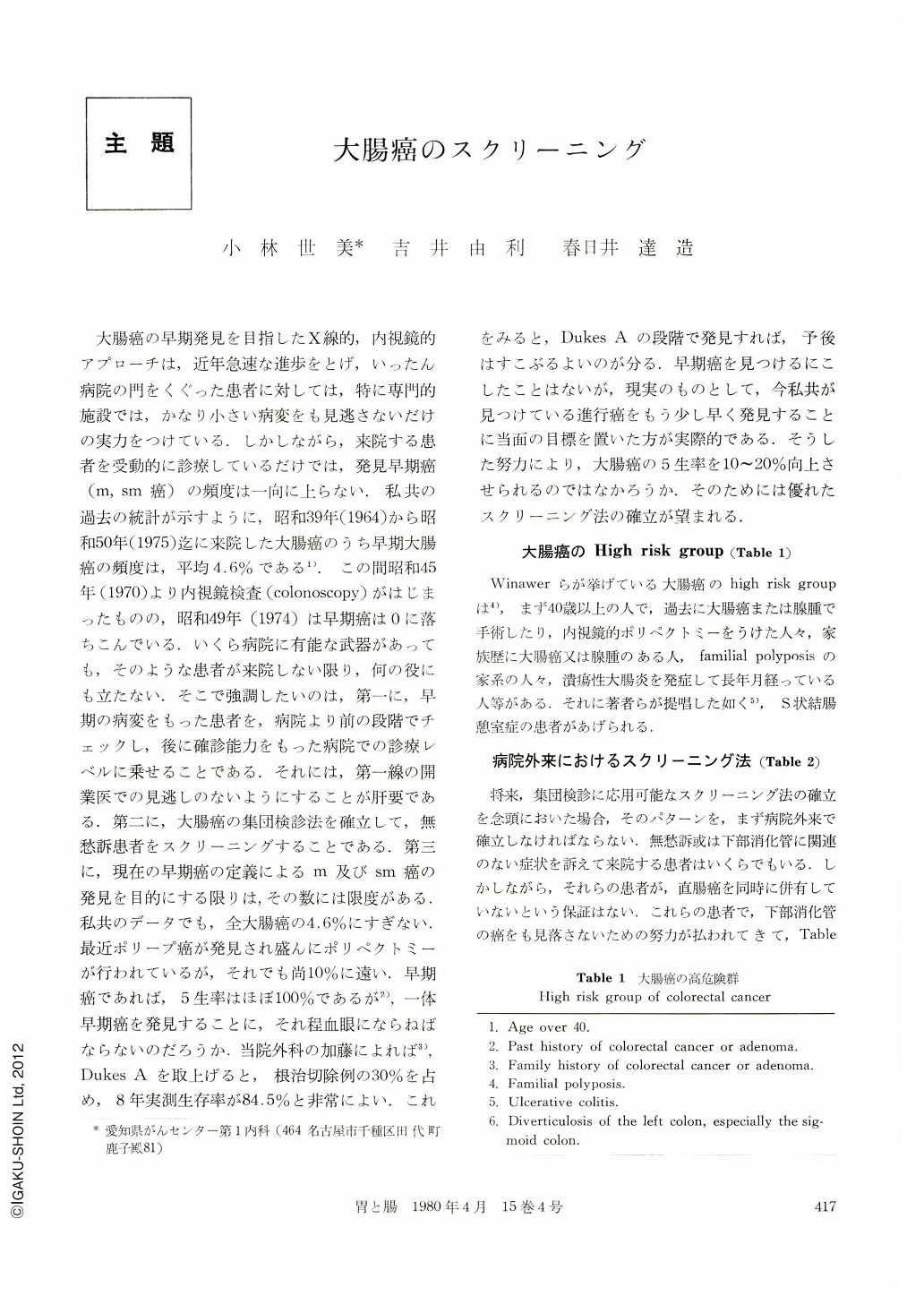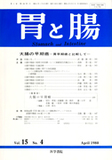Japanese
English
- 有料閲覧
- Abstract 文献概要
- 1ページ目 Look Inside
大腸癌の早期発見を目指したX線的,内視鏡的アプローチは,近年急速な進歩をとげ,いったん病院の門をくぐった患者に対しては,特に専門的施設では,かなり小さい病変をも見逃さないだけの実力をつけている.しかしながら,来院する患者を受動的に診療しているだけでは,発見早期癌(m,sm癌)の頻度は一向に上らない.私共の過去の統計が示すように,昭和39年(1964)から昭和50年(1975)迄に来院した大腸癌のうち早期大腸癌の頻度は,平均4.6%である1).この間昭和45年(1970)より内視鏡検査(colonoscopy)がはじまったものの,昭和49年(1974)は早期癌は0に落ちこんでいる.いくら病院に有能な武器があっても,そのような患者が来院しない限り,何の役にも立たない.そこで強調したいのは,第一に,早期の病変をもった患者を,病院より前の段階でチェックし,後に確診能力をもった病院での診療レベルに乗せることである.それには,第一線の開業医での見逃しのないようにすることが肝要である.第二に,大腸癌の集団検診法を確立して,無愁訴患者をスクリーニングすることである.第三に,現在の早期癌の定義によるm及びsm癌の発見を目的にする限りは,その数には限度がある.私共のデータでも,全大腸癌の4.6%にすぎない.最近ポリープ癌が発見され盛んにポリペクトミーが行われているが,それでも尚10%に遠い.早期癌であれば,5生率はほぼ100%であるが2),一体早期癌を発見することに,それ程血眼にならねばならないのだろうか.当院外科の加藤によれば3),Dukes Aを取上げると,根治切除例の30%を占め,8年実測生存率が84.5%と非常によい.これをみると,Dukes Aの段階で発見すれば,予後はすこぶるよいのが分る.早期癌を見つけるにこしたことはないが,現実のものとして,今私共が見つけている進行癌をもう少し早く発見することに当面の目標を置いた方が実際的である.そうした努力により,大腸癌の5生率を10~20%向上させられるのではなかろうか.そのためには優れたスクリーニング法の確立が望まれる.
Although and endoscopic diagnoses have been well established, it is most important to develop a screening system for asymptomatic population for early detection of colorectal cancer.
From a prognostic point of view, nearly 90% of patients with Dukes' A carcinoma can survive five years. Therefore, it would be practical to aim at detecting a Dukes' A carcinoma rather than an early colorectal cancer without involving the muscularis propria.
First of all, it is necessary to identify individuals at high risk for colorectal cancer to perform the screening efficiently.
Rectal examination and fecal occult blood test are employed as screening method at the outpatient clinic. Rectal examination should be able to palpate a mass of the lower rectum in 50% of colorectal cancer. Fecal occult blood testing can cover the rest of the large bowel to be a site of possible bleeding.
We have been employing “Shionogi Slide” (guaiac impregnated filter paper slide) for fecal occult blood testing. A positive rate was 94.8% (18/19) in carcinoma. without overt rectal bleeding and 71.8% (28/39) in adenoma. A false positive rate in the same period accounted for 18.2%. A positive result was yielded in 19 (95%) of 20 early carcinomas without overt bleeding.
We recently began to apply a fecal occult blood test to mass screening of asymptomatic people for colorectal cancer in combination with gastric mass screening method. This combination yields an advantage that mass screening upper gastrointestinal series gives us an important information on the presence or absence of upper gastrointestinal diseases. We utilize Hemoccult slide which is about one-fourth as sensitive as the “Shionogi Slide”, to reduce the frequency of false positive reaction in asymptomatic population.
It is emphasized that education to the public via mass communication and solution of many problems in performing fecal occult blood testing would be extremely important, in order to further expand this mass screening program.

Copyright © 1980, Igaku-Shoin Ltd. All rights reserved.


